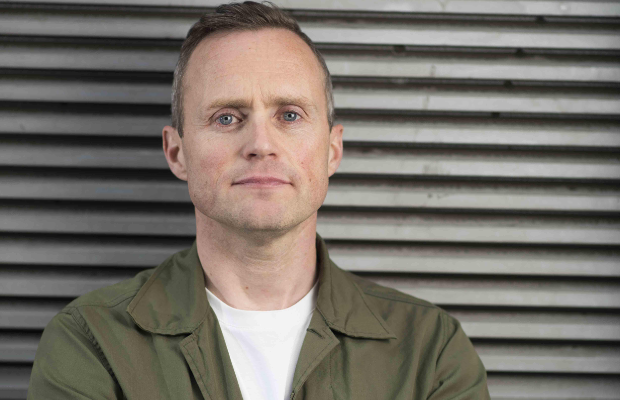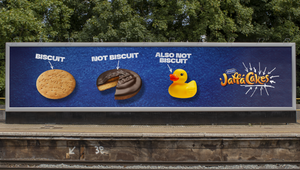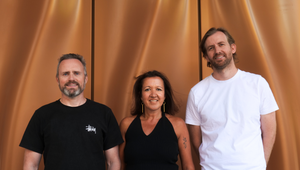
Why Creatives Shouldn’t Let a Good Obstacle Go to Waste

Andy Jex has been thinking about obstacles recently. The pandemic made a lot of things much harder to do, but that’s not always a bad thing, he says. It’s sparked a lot of conversations at TBWA\London, where Andy works as chief creative officer, and as a result he’s been trying to instil a particular ethos in his creative department.
“When big obstructions and negative things happen that are unexpected, the natural reaction is to just run away, repel, say it's all gone bad or try and protect what you've got,” he says. He’s interested in how so much great, iconic work – both in and outside of advertising – gets its uniqueness from something that could easily have been seen as a problem. “There's often a story, a reason of how they got there and why it was so magnificent, that had something to do with something that went wrong or changed or something that they couldn't predict happened, or something got in the way and they had to think on the spot – or they had to find a way out of it. And that leads you to do stuff in ways you wouldn't normally do.”
Andy’s come to the realisation that ‘perfection is not paradise’. Having spent more than 20 years in advertising agencies, he’s well aware of the tendency to create a bubble of a kind of working that feels safe. “It's your comfort zone and you do more of the same thing,” he says. “But you keep doing the same thing and it's like the novelist Barbara Cartland, who's probably written more books than anybody, but she's written effectively the same book 2,000 times. Which is great if you want to read that again, but it doesn't change.”
Recently, Andy’s been looking into ways people embrace obstacles to find new ways of creating. A famous starting point is Brian Eno’s Oblique Strategies – literally a deck of cards that each contain a suggestion, aphorism or remark which can be used to break a deadlock or dilemma. As Andy relishes recounting he gives them to musicians telling them to “interpret it through the manner as if you were a gardener”, or “pretend that you're playing your instrument back to front” – an artificial way to impose constraints on creativity. “I'm sure it would have pissed off loads of the artists and upset many musicians,” he laughs. “But I guess if you're David Bowie, you sort of embrace that because that's just music to his ears.”
Another great example of problems improving creative output is 1979 nightmare-scape ‘Apocalypse Now’. The ‘Hearts of Darkness’ making-of film is about the disasters of shooting it. “You've got a director and crew all on coke - and worse. You've got an actor who has a heart attack during the filming. You've got monsoon rain,” says Andy. “Everything that could go wrong goes wrong, and it might have affected the outcome but it doesn't make it a bad thing. It makes it a great movie.”
In the world of TV, Andy points to the last episode of classic British comedy series ‘Blackadder’. The characters in the historical sitcom are fighting in the First World War and the final scene shows them emerging from their trench to go over the top, before a freeze frame and fade to poppies springing up from the Flanders Fields. “That sort of hairs on the back of your neck moment, that was never intended,” says Andy. “That's the famous scene and it was just serendipity. They were supposed to be going over the top and getting gunned down. But the footage was so bad, they just couldn't use it. So they just literally slowed down what they had and crossfaded to some footage of poppies, but in doing that created that iconic, memorable moment.”
In advertising he points to heavily regulated categories, like tobacco in the UK in the '70s and '80s, when advertising cigarettes was allowed, but with strict rules about what could be included. “Everyone talks about B&H and Silk Cut campaigns because they couldn't say anything, they couldn't talk about it, they couldn't even show the product,” says Andy. “So they were so surreal, but people loved them and I guess they worked until they got completely banned.”
The same happens in the alcohol category, he suggests, nodding to “the magic of Guinness, Smirnoff and Carlsberg”. Anyone working on alcohol accounts in the UK knows the complex set of restrictions, from not suggesting alcohol is the reason for someone’s success, to not implying that alcohol has therapeutic qualities. “There's so many things you can't do. But it does make you think in a different way,” says Andy.
Regulation is an obstacle that Andy’s preparing to embrace in his work at TBWA\London. The agency works on McVitie’s biscuits, which will soon be impacted by the UK’s high fat, sugar and salt (HFSS) regulations. Effectively that means it will be impossible to advertise any products with high sugar, salt or fat on TV before 9pm, or on social media at all. Andy reflects that this will limit McVitie’s product advertising options in terms of media. “You can use TV in a brand way. But you can't use it in a product way,” he says. “So it does change what you do. On top of that, you have to start thinking about creating different products or sponsoring or doing partnerships. You kind of have to think outside of the usual media constraints.”
He’s excited about this obstacle because suddenly the big TV product ad will be out of the question. It means more focus and resources can be put into media that’s playing a more innovative role in culture. “There's often a lot of pressure on where the money goes. The money goes on media and particularly TV,” he says. “So there's often a lot of pressure on a TV ad. Whereas when you do a promotion or a special limited edition thing, sometimes all the eyes with the money are off those things – the sideline projects. But sometimes that's where a lot of the magic can happen, rather than the big thing down the middle. You only have to look at a lot of things that win awards, particularly in Cannes. Some of the most exciting stuff is that they're not TV ads anymore. They're things that are activated in culture and in the world.”
So is Andy going to be running his creative department with a deck of Oblique Strategies cards? He laughs at the thought of his creatives dreading it. “‘Oh, here he comes with his little book block of cards again.' I think he goes too far when you say it like that, but what I say to the creative department is when the shit hits the fan it doesn't necessarily mean shit has hit the fan. There can be a way out of it that's way better than you've ever thought.
“I've been very guilty in the past, when something goes wrong or something gets in the way, of throwing my toys out the pram because I thought ‘it's all gone, that's it, it's dead’. And then you end up eating humble pie ten minutes later when you realise actually it's going to be better now.”
The key is to keep an open mind to the potential of obstacles. “I think the thing is not to look for them, but you just have to be aware of when they occur,” he says. “I think it's about, when something crops up, being aware of it and realising this is going to make you think differently.
What's the old political saying about not letting a good crisis go to waste? It's a similar thing.
“And it doesn't mean that everything is always going to be good. It isn't always the case. But I think there's an interesting way of thinking when you embrace the curveballs, the negative things and obstacles”.















